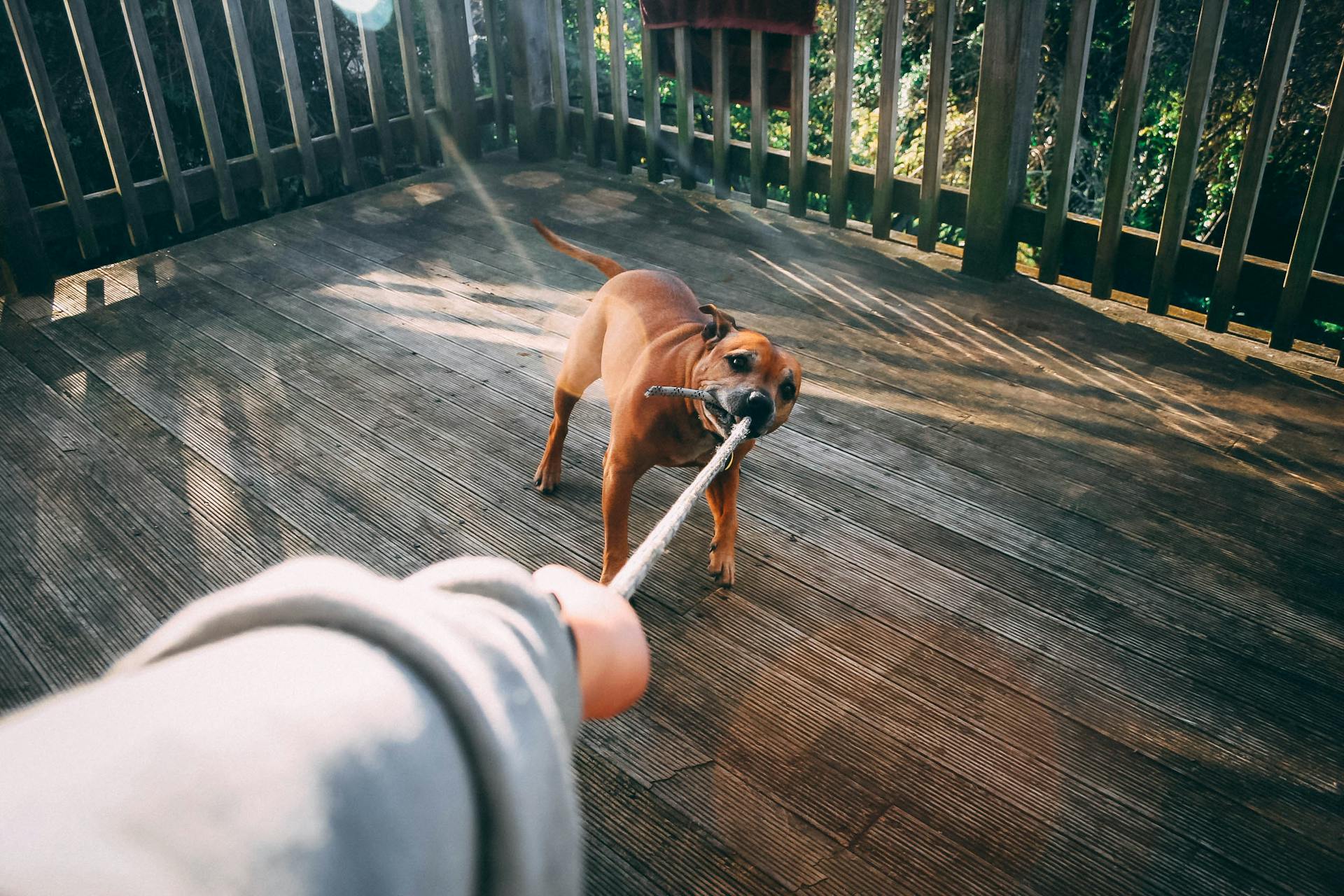
Renters insurance can provide financial protection in case your dog bites someone, but it's essential to understand the specifics of your policy.
Most renters insurance policies have a liability clause that covers dog bites, but the extent of coverage varies.
If your dog bites someone, you'll need to report the incident to your landlord and your insurance provider as soon as possible.
Typically, renters insurance policies have a deductible, which is the amount you'll need to pay out of pocket before your insurance kicks in.
You might like: Vehicle Insurance Policies
Does Renters Insurance Cover Dog Bites?
Renters insurance typically includes liability coverage that can help protect you in case your dog bites someone. This coverage can be a lifesaver if your dog causes injuries or property damage.
Some renters insurance companies don't cover injuries caused by dogs with a bite history, while others won't cover injuries caused by specific breeds they consider high-risk, such as pit bulls or rottweilers. The specifics vary by company, so it's essential to check your policy.
Intriguing read: Does Health Insurance Cover Motorcycle Accident Injuries
Your liability coverage may not cover injuries if the injured person provoked your dog before the bite. If you have a dog or are considering getting one, it's crucial to check your insurance policy for possible pet exclusions or limitations.
Some states, including Georgia, require renters insurance companies to cover injuries caused by your dog. If you live in one of these states, your liability coverage will likely cover dog bites.
Renters insurance companies may charge a higher rate if your dog has a bite history or falls on their "dangerous breeds" list. This is something to consider if you're planning to get a dog.
Here are some key points to keep in mind:
- Check your insurance policy for possible pet exclusions or limitations.
- Some states require renters insurance companies to cover injuries caused by your dog.
- Renters insurance companies may charge a higher rate for dogs with a bite history or on their "dangerous breeds" list.
- Your liability coverage may not cover injuries if the injured person provoked your dog.
Understanding Liability
The dog owner is typically held accountable for any injuries their dog causes. However, the landlord or property owner might also bear responsibility in some situations.
Liability for dog bites can be complicated, especially in apartment complexes. The landlord or property owner might be considered partially liable if they knew a dog was dangerous or aggressive and failed to act.
You might enjoy: Landlord Public Liability Insurance
If a landlord knows a dog is a threat and does nothing, they could be considered partially liable for the resulting injuries. In such cases, the injured party might file a lawsuit against the dog owner and the landlord.
The dog owner is usually the first party held responsible for dog bites. However, the situation can become more complex if the landlord knows a dangerous dog on the property and fails to take action.
Here are some key points to consider:
- The dog owner is typically held accountable for any injuries their dog causes.
- The landlord or property owner might also be considered partially liable if they knew a dog was a threat and failed to act.
- Liability for dog bites can be complicated, especially in apartment complexes.
- The injured party might file a lawsuit against the dog owner and the landlord if the landlord knew a dog was a threat and did nothing.
Filing a Claim
If you've been bitten by a dog and the owner has renters insurance, you can file a dog bite claim against the insurer. The insurance company should have a clear liability claims process.
You'll need to provide documentation of the incident, including the date, time, and location of the dog bite, as well as photographs of the scene and any visible injuries. This will help the insurance company assess liability and determine the extent of the damages.
Suggestion: Does Apartment Building Insurance Have Dog Bite
If the dog owner has no insurance, you'll need to look elsewhere to get compensated for your losses. However, if the owner does have insurance, you can file a claim and potentially receive a settlement for your medical costs and other expenses.
Here are some key factors to consider when filing a claim:
- You may struggle to succeed on a claim if you treated the injuries on your own and don't have medical bills.
- You may also struggle if the costs of your treatment are under the policy's deductible.
- Additionally, if you provoked the dog, you may not be able to succeed on a claim.
It's a good idea to consult with a personal injury attorney, especially if your injuries are severe and your medical costs are high. They can help you navigate the claims process and ensure you receive a fair settlement.
Steps After a Bite
After a dog bite, it's crucial to seek immediate medical attention, even if the bite seems minor, as it can cause serious injuries and infections.
You should document the incident by taking photos of your injuries, the location of the bite, and the dog, if possible. Collect contact information from any witnesses who saw the incident.
Additional reading: Dog Bite Insurance Claim
Reporting the bite to property management is essential, as they may need to document the event and take further action regarding the dog and its owner. This should be done as soon as possible.
Consulting a legal professional is also vital, as dog bite laws vary by state and locality, and they can advise you on your rights and options for seeking compensation.
Filing a Claim
Filing a claim can be a daunting task, but knowing the steps involved can make a big difference. If you've been bitten by a dog and the owner has renters insurance, you can file a claim against the insurer.
The insurance company should have a clear liability claims process, which you should follow to the letter. You'll need to provide documentation, including the date, time, and location of the incident, as well as photographs of the scene and any visible injuries.
The insurance company will review your case, and if you're covered by the policy and the dog owner is liable, they'll make an initial settlement offer. However, this offer is often far below what you're entitled to receive, especially if your injuries are severe and your medical costs are high.
See what others are reading: Does Not Wearing a Seatbelt Affect Insurance Claim

It's essential to consult with a personal injury attorney to ensure you receive fair compensation. They can guide you through the process and help protect your interests.
You may struggle to succeed on a claim if you've treated the injuries on your own and don't have medical bills, or if the costs of your treatment are under the policy's deductible. Additionally, if you provoked the dog, you may not be eligible for a claim.
Here are some key factors to consider when filing a claim:
- Seek medical attention and document the incident, including the date, time, and location of the dog bite.
- Exchange contact information with the injured party, including names, phone numbers, and addresses.
- Cooperate fully with the insurance company's investigation and provide any additional information they may request.
- Consult with a personal injury attorney, especially if your injuries are severe and your medical costs are high.
Return
So you've finally decided to file a claim, and you're wondering what's next. The good news is that renters insurance typically covers dog bites, including bodily injury and property damage.
As long as the incident occurred within the rental property, your insurance policy should kick in. However, if the bite happened outside the apartment, such as in a dog park or on a sidewalk, you might be out of luck.

The liability coverage of your renters insurance policy usually includes bodily injury and property damage liability. This means you're protected if your dog causes harm or damages someone else's property.
If you're unsure about the specifics of your policy, it's a good idea to review it carefully. You can also consult with your insurance provider to get a better understanding of what's covered and what's not.
To give you a better idea of what's not covered, here are some examples of situations where renters insurance might not apply:
- Bites that occur in a dog park
- Bites that happen on a sidewalk away from the rental property
- Bites that occur on the grounds of the apartment building, but outside
- Bites that happen in a common area of the apartment building, but not in your apartment
Insurance and Pet Ownership
You can add a pet to your renters insurance policy, but be prepared to answer questions about your dog's breed and bite history. An insurance agent will likely ask about these specifics when you call to add your pet to the policy.
Some renters insurance companies have exclusions or limitations for injuries caused by your pet, so it's essential to check your policy for any pet-related exclusions. You can also get an animal liability policy from another company if your insurance company refuses to cover your dog.
Expand your knowledge: What Is Business Owners Insurance
If you have a dog that's considered a "high-risk" breed, you may be charged a higher rate or face exclusions on your policy. Some insurance companies don't cover injuries caused by certain breeds, such as pit bulls, rottweilers, and wolf hybrids. It's best to check your policy or ask your agent for specific information about your dog's breed.
Here are some examples of insurance companies that may have exclusions for certain breeds:
- State Farm
- USAA
Keep in mind that some states, like Georgia, require liability protections in renters insurance companies to cover injuries your dog causes. So, it's always a good idea to check your policy and ask your agent about any specific requirements or exclusions in your area.
Adding a Pet
Adding a pet to your renters insurance policy is a relatively straightforward process. You can usually just call your insurance company and answer a few questions about your dog, such as its breed and whether it has bitten anyone in the past.
Some insurance companies may also allow you to add a pet to your policy online or through their phone app. This can be a convenient option if you're short on time or prefer to do things digitally.
If your insurance company refuses to cover your dog, you may be able to get an animal liability policy from another company. This type of policy can provide protection in case your dog causes injury or damage to someone else's property.
You can also consider getting an umbrella insurance policy, which offers personal liability coverage that protects you from insurance claims for damages done through your negligence. This type of policy can provide additional protection in case your dog causes harm or damage.
It's worth noting that liability coverage is typically included in home, tenant, and condo policies, so you may already have some level of protection in place. However, there may be exceptions depending on where you live and the specific circumstances of your dog's behavior.
Coverage
Renters insurance typically includes liability coverage that extends to incidents that occur within your rented premises, including dog bites.
This coverage can prove invaluable if your dog bites a visitor, causing injuries or property damage. However, there are exceptions to consider.
Some renters insurance companies don't cover injuries caused by dogs with a bite history, and others won't cover injuries caused by dog breeds they consider dangerous, such as pit bulls and rottweilers.
Some companies, including State Farm and USAA, don't ask about your dog's breed, while others place sublimits on dog bites, capping coverage at $25,000.
Your policy may provide up to $100,000 in coverage for injuries or damage you cause, but the coverage for injuries or damage your pet causes may be capped at a lower amount.
Some states, including Georgia, require the liability protections in renters insurance companies to cover injuries your dog causes.
If the injured person provoked your dog before the bite, you may not be responsible for their medical bills.
Here's an interesting read: Does Umbrella Insurance Cover Dog Bites
Here are some possible pet exclusions or limitations to consider:
- Dogs with a bite history
- Dog breeds considered dangerous by your insurer
- Sublimits on dog bites
- Higher rates for dogs with a bite history or on the "dangerous breeds" list
It's essential to check your insurance policy for possible pet exclusions or limitations if you have a dog or are considering getting one.
Sources
- https://quotewizard.com/renters-insurance/dog-bites-and-renters-insurance
- https://www.insurewithkevin.com/does-your-renters-insurance-shield-you-from-dog-bite-claims/
- https://blog.panda7.ca/en/will-my-renters-insurance-cover-me-if-my-dog-bites-someone/
- https://www.e360insurance.com/blog/dog-bites-apartments-liability-insurance/
- https://www.shouselaw.com/ca/blog/does-renters-insurance-cover-dog-bites/
Featured Images: pexels.com


